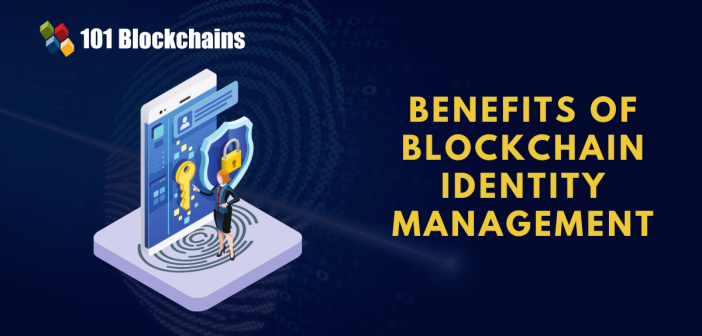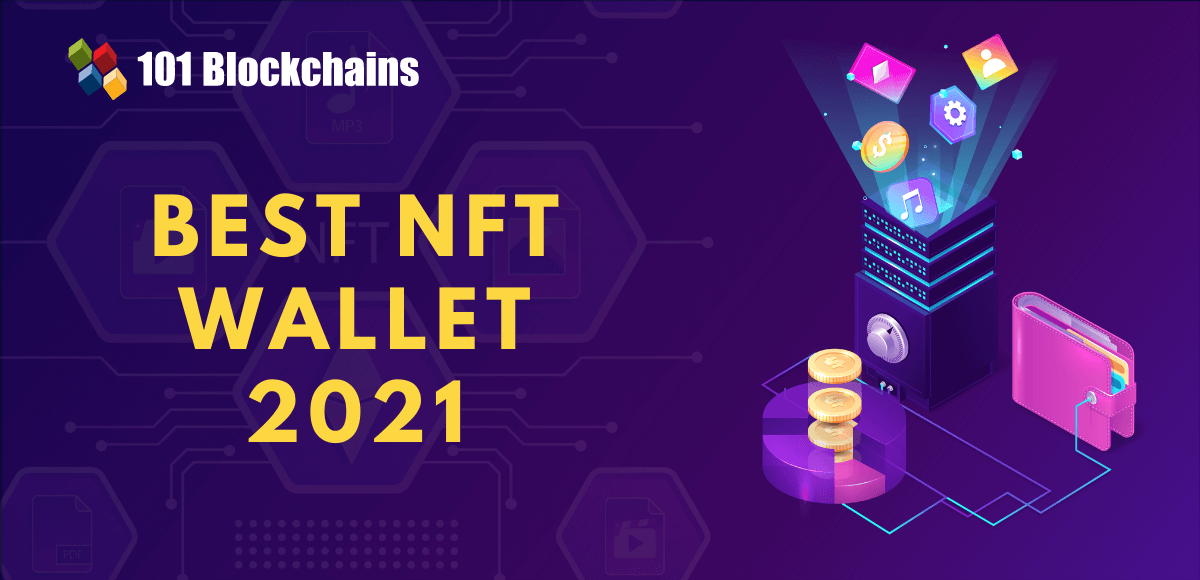Learn how blockchain truly works, master key definitions, and uncover what makes smart contracts so "smart." Dive into the fundamentals, gain valuable insights, and start your blockchain journey today!

Reviews
Gwyneth Iredale
on April 22, 2021
Top 7 Benefits of Blockchain Identity Management
The impact of Industry 4.0 has been evident throughout the world as the revolution is prompting the creation of autonomous and intelligent systems based on data and machine learning. The growing emphasis on blockchain identity management benefits has created many questions in the minds of industry experts.
Will blockchain have a positive impact on digital identity management? Technology is gradually integrating with almost every facet of our lives, thereby presenting the need to focus more on digital identity and data privacy in the cyber landscape. Digital identity is quite a crucial term in the existing time where consumers are adopting the internet for carrying out online transactions throughout multiple devices.
Many organizations all over the world have experienced numerous setbacks due to identity theft, thereby calling for innovative measures to manage digital identity. The following discussion attempts to reflect on the role of blockchain in digital identity management. With a primary focus on benefits of blockchain for identity management, the discussion aims to identify the impact of blockchain on the identity management landscape.
Build your identity as a certified blockchain expert with 101 Blockchains’ Blockchain Certifications designed to provide enhanced career prospects.
Reasons to Focus on Digital Identity
Before the discussion on benefits of blockchain identity management, it is important to find out the reasons for such emphasis on digital identity. As discussed already, digital identity has become an integral part of our lives with the rapid expansion of technology. You need an account for your social media profiles where you have to enter personal information such as name, address, date of birth, phone number, and others. The digital identity helps you interact with and use different services available through the internet, such as banking services.
Digital identity has come under formidable scrutiny in recent times due to its critical role in online financial transactions. It is important for speeding up the customer on-boarding process while ensuring accuracy and prevention of fraudulent activities. Digital identity is also helpful in restricting Anti Money Laundering or AML activities. Most important of all, digital identity management also focuses on standardization and streamlining of citizen services. Therefore, a robust digital identity platform could help in speeding up the delivery of multiple services.
The need for reflecting on blockchain identity management benefits emerges profoundly from the lack of security that is generally expected from identity management. The radical shift into the digital age has also created formidable new approaches to identity theft. Therefore, hackers, scammers, and other malicious agents are leveraging the new tricks of identity theft for robbing people of their money. Furthermore, conventional identity management systems relying on paper-based evidence present concerns such as misappropriation of identity.
Four years ago, around 16.7 million people were victims of identity fraud. According to the 2021 Identity Fraud Study report by Javelin Strategy and Research, identity fraud scams accounted for around $43 billion from the $56 billion worth of total fraud losses combined in 2020. Therefore, it is clearly evident that existing identity management systems need improvement, and blockchain could be the most probable answer.
Want to understand the concept of decentralized identity? Enroll now in the Decentralized Identity Fundamentals Course!
How Does Blockchain Impact Digital Identity Management?
Now, the primary question revolving around everyone’s mind must be pointing towards the impact of blockchain on identity management. How is it possible to achieve the benefits of blockchain identity management? Many modern digital identity solutions are crafted with extreme sophistication, albeit with a small setback. Digital identity solutions deployed on centralized systems are generally cost-intensive and do not ensure desired results all the time.
The formidable setback with centralized identity management systems refers to the allocation of control to one particular entity. So, the benefits of blockchain for identity management are being considered, with blockchain offering inherent traits of user control, trust, and transparency.
Blockchain-based digital identity management solutions generally include the following five pillars –

1. Trust
The metadata leveraged for communications in blockchain-based systems is housed in a distributed ledger. Subsequently, the blockchain network uses consensus mechanisms for verifying the authenticity of data through various nodes. The decentralized nature of blockchain is particularly useful in the case of digital identities as it reduces the risks of compromises in data.
2. Security
The most notable entry among blockchain identity management benefits would also refer to security. As a matter of fact, blockchain technology features an inherent design for maintaining data in an encrypted and immutable state. Furthermore, the cryptographic security in blockchain is also another noticeable trait of blockchain for considering its efficiency in boosting security of identity management systems. Blockchain technology could help in improving security of digital identity while also ensuring that it is traceable. In addition, blockchain-based identity management systems resolve the concerns related to vulnerabilities in password protection.
3. Simplicity
Blockchain technology for identity management could also result in simplicity of processes for all the involved stakeholders. Identity issuers could experience benefits of simplicity with the automation of processes for issuing digital identity that result in efficient reduction of time and manual efforts required for issuing identity. Identity verifiers can find benefits of blockchain identity management with cost-effective and simpler customer onboarding and data verification process.
Identity owners can find benefits of simplicity with blockchain-based identity management systems that shift away from centralized data management. Identity owners or users get complete control over their identity. Furthermore, users could also create their personalized identity data for the purpose of social media or financial transactions. This is a concept known as Self-Sovereign Identity.
4. Integrity
Blockchain-based identity systems offer the ability to maintain each identity throughout different nodes in the network. Continuous reconciliation of data irrespective of distributing data across peer-to-peer networks helps in maintaining the data updated. Furthermore, blockchain identity management benefits also point out the lack of a single point of failure. Without a single point of failure, hackers could experience formidable difficulties in disrupting the integrity of a specific data set.
5. Privacy
The final aspect transformed by blockchain in digital identity management would obviously point out towards privacy. Regulators throughout the world are advocating for safeguarding privacy of sensitive and personal information of citizens. Therefore, blockchain identity management solutions such as combining digital signature with blockchain encryption can offer inherent privacy in design. Attaching digital signatures to all transactions of users also ensures that they are not vulnerable to tampering.
Curious to learn about blockchain implementation and strategy for managing your blockchain projects? Enroll Now in Blockchain Technology – Implementation And Strategy Course!
Scope of Blockchain in Identity Management Today
The benefits of blockchain identity management have started gaining attention with the profound impact of blockchain on the existing digital identity landscape. Readers have already perceived an impression of the notable ways in which blockchain changes digital identity management. Now, let us take a look at how blockchain resolves existing identity issues.
Please include attribution to staging2.staging2.101blockchains.com with this graphic. <a href='https://staging2.staging2.101blockchains.com/blockchain-infographics/'> <img src="https://staging2.staging2.101blockchains.com/wp-content/uploads/2021/04/top-blockchain-identity-management-benefits.png" alt="top blockchain identity management benefits" border='0' /> </a>
- Problem of Inaccessibility
Around 1.1 billion people worldwide don’t have any proof of identity. Without any identity, it’s almost as if they don’t exist on the face of this planet. Alarmingly, around 45% of the people without any proof of identity account for 20% of the poorest in the world.
More than a billion people cannot conventional identification systems due to complicated processes for identification paperwork, lack of knowledge, lack of access, and associated expenses. Lack of any physical identity creates setbacks for enrolment in school, applications for jobs, or accessing government services and financial services.
On the other hand, around 60% of the 2.7 billion people in the world without access to banking services own smartphones. Therefore, blockchain-based mobile identity solutions could serve as promising answers for the needs of vulnerable citizens worldwide.
- Problem of Fraudulent Identities
The digital identity ecosystem is highly fragmented as users have to skip between different identities for using different websites. Users don’t have a standardized approach or system for using data generated by one platform for applications on another platform. Most importantly, the weak association between offline and digital identities enables easier creation of fake identities.
Blockchain identity management benefits primarily counter the problem of ‘fake identities.’ Fake identity provides the ideal foundation for counterfeit interactions, thereby resulting in incidents of fraud, ultimately leading to loss of revenue. On a broader scale, fake identities can also result in development and circulation of ‘fake news,’ which can pose formidable threats to society in general.
- Problem of Data Security
The benefits of blockchain identity management could also help in resolving the problems of data security. Presently, centralized government databases powered with legacy software are responsible for storing valuable identification information of many users.
However, the massive centralized systems come with single points of failure, and the personally identifiable information of user accounts stored in the systems makes them attractive to hackers. Recent reports have suggested that personally identifiable information is the most preferred target in breaches, with around 97% of all breaches in 2018 involving PII data breaches.
In 2018, around 2.8 billion consumer data records were breached, thereby resulting in a cost burden of over $654 billion. Therefore, blockchain could help in leveraging the benefits of cryptography to develop new identity management systems on the concept of decentralized identities.
Advantages of Blockchain Identity Management
Blockchain identity management is more of a necessity than a technological privilege in the existing environment. The way it changes conventional identity management and resolves the existing identity issues obviously draws attention to blockchain identity management benefits. Here are the top seven benefits that you can avail with blockchain-based identity management solutions.
- Relief from Cumbersome Paper-based Identity Management
The first and foremost entry among benefits of blockchain for identity management would definitely point towards simplicity. Blockchain identity management solutions can help users in obtaining duplicate ID proof in event of losing their original documents. People who lose or misplace their original ID proof documents might have to go through certain processes to get back their ID proof document.
For example, they may have to visit the related government department and go through a time-consuming process to get duplicate ID proof. Government authorities generally have hordes of information while depending on manual processes, thereby creating delays in issuing duplicate IDs. In such cases, people living away from government service centers and people from underprivileged sections of the society experience the most difficulties in accessing a duplicated ID proof.
Blockchain identity management benefits such as ensuring that records are permanent and tamper-proof solve such issues. Government authorities could store the ID proof of individuals on a blockchain with the assurance of safety and reliability. In addition, security of blockchain ensures that the ID proof record is permanent.
- Easier ID Verification
Identity management solutions could experience the burden of complexity due to various silos and preexisting manual processes. On the other hand, blockchain technology can power up identity management solutions to overcome these setbacks. The benefits of blockchain identity management for identity verification are clearly visible in examples of identity management solutions, such as Blockpass.
Blockpass features a blockchain-based ‘Know Your Customer’ or KYC portal, which serves as an ID verification portal. The KYC portal is termed as ‘Blockpass KYC Connect’ and can help businesses comply with strict KYC regulations in various regulated industries. The portal also offers flexibility for organizations to carry out user onboarding tasks through ID verification.
Blockpass leverages smart contracts to ensure Anti Money Laundering or AML and KYC compliance. The blockchain identity management benefits of identity verification in the example of Blockpass presents prospects for other solutions. Entrepreneurs can also leverage blockchain platforms such as Ethereum to develop their own decentralized apps or dApps for identity management.
- IoT System User Identity Management
Internet of Things or IoT is invading almost every aspect of our life at a faster scale. Devices such as fitness trackers, smart appliances, and remote patient monitoring systems enabled with IoT collect data and transfer it to the related service providers. Presently, there are billions of IoT-enabled devices streaming highly valuable data, with many more to join the ecosystem soon.
Interestingly, the internet is the stage for all the communications between IoT-based devices, thereby presenting a profound security risk. Many IoT devices collect Protected Health Information or Personally Identifiable Information, thereby leading to serious risks for users. In this case, the benefits of blockchain for identity management are profoundly favorable for IoT devices.
Blockchain-based identity management for IoT devices provides the assurance that users have full control over the data collected by IoT devices. In addition, blockchain identity management solutions for IoT devices also offer promising security for preventing hackers against accessing sensitive information during transfer between IoT devices.
Want to understand the fundamentals of the Internet of Things (IoT)? Enroll Now in IoT Fundamentals Course!
- Self Sovereign Identity
The digital world has opened up many opportunities while setting many challenges over the course of time. However, it also has many murky corners which come to public light from time to time. The Facebook/Cambridge Analytics data scandal clearly shows the darker side of how tech giants can control and manage the digital identity of users. Such incidents call for further emphasis on understanding risks of digital identity management.
As discussed already, conventional identity management presents complexities and difficulties for users in management of their own digital identity. The concept of Self Sovereign Identity or SSI can serve a promising answer in this case with blockchain identity management benefits. First of all, users get complete ownership and control over their digital identity.
The consent of the primary user is essential for other parties to access their identity information. SSI is inherently trustless by design, thereby avoiding the need for trusted 3rd party providers. The most common example of the use of blockchain for obtaining SSI is Hyperledger Indy. The enterprise blockchain framework by the Hyperledger Consortium is the proven answer for digital identity use cases.
- Non-Custodial Login Solutions
Internet users have to trust third parties while logging into internet-based services or even signing into their employer’s networks for safety of their ID and password. Generally, the service provider or employer maintains central servers for safety of user credentials. Such solutions are referred to as ‘Custodial Login Solutions’, and just like any other centralized solution, they are highly vulnerable to hacking.
As a matter of fact, centralized systems serve as appealing targets for hackers. However, the benefits of blockchain identity management can completely change the scenario with decentralization and improved security features. Blockchain identity management solutions leverage public-private key pairs for login, thereby ensuring safety of login credentials.
- Decentralized Web Identity Solutions
Blockchain identity management benefits also provide identity management for decentralized web. Different third-party services such as internet service providers track the online activity of users. So, internet users are turning towards a decentralized web where they don’t need to provide personal information for accessing services.
However, users must have one digital identity to validate their credentials anywhere on the decentralized web, and blockchain can help. Users could place their digital ID on a blockchain, and internet-based service provides could access the ID for verification objectives.
- Improved Safeguards for Critical Infrastructure
The importance of better security in identity management is not limited only to logging into our social media accounts. Many of the critical infrastructures such as grids and power plants are still subject to password protection. Authentication systems powered by blockchain could offer more advantages than just security and personal convenience. Employees of the infrastructure can only access the important control systems, thereby ensuring limited potential for attacks on critical infrastructure.
Conclusion
On a concluding note, it is clearly evident that blockchain identity management benefits can completely transform the digital landscape. The applications of blockchain in digital identity management present viable prospects for improving security, transparency, and control over data. In the long run, improvements over the existing identity management systems were inevitable.
However, blockchain is presenting the solutions of the future for identity management now. Presently, the applications of blockchain-based digital identity management solutions are slowly gaining recognition, with a few notable examples. Let us see how far blockchain pushes the boundaries of digital identity management in the future.
*Disclaimer: The article should not be taken as, and is not intended to provide any investment advice. Claims made in this article do not constitute investment advice and should not be taken as such. 101 Blockchains shall not be responsible for any loss sustained by any person who relies on this article. Do your own research!








